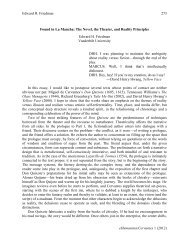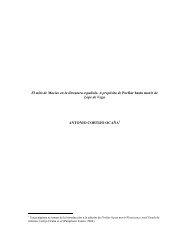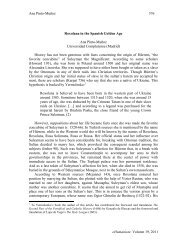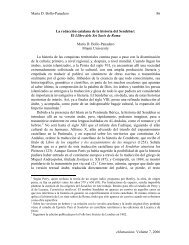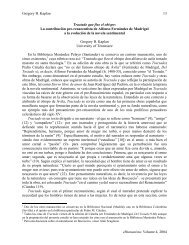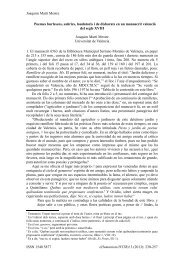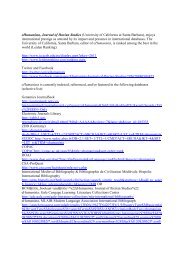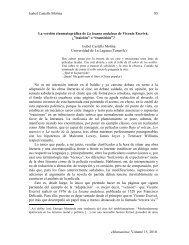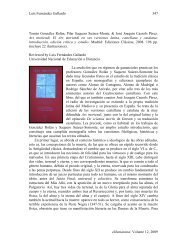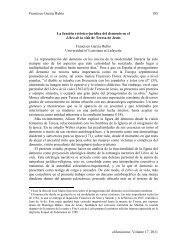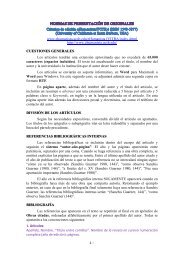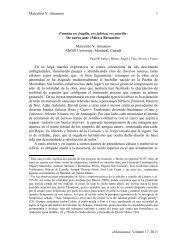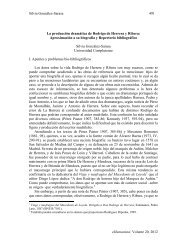Gregory Peter Andrachuk eHumanista: Volume 17, 2011 540 Alonso ...
Gregory Peter Andrachuk eHumanista: Volume 17, 2011 540 Alonso ...
Gregory Peter Andrachuk eHumanista: Volume 17, 2011 540 Alonso ...
You also want an ePaper? Increase the reach of your titles
YUMPU automatically turns print PDFs into web optimized ePapers that Google loves.
<strong>Gregory</strong> <strong>Peter</strong> <strong>Andrachuk</strong><br />
kinsman the Viceroy: “sucedió que seyendo Virrey de Nápoles don Remón de<br />
Cardona, e como pariente e buen cauallero, recogido don Juan de Cardona, tuvo cargo<br />
e capitanía de cient ombres de armas...E hallóse en la batalla de Ravena, donde<br />
haziéndo su oficio como quien él era, fue preso e mal herido e en la prisión murió de<br />
aquellas heridas” 15 (1974, II, 650). Other sources confirm the sibling relationship of<br />
Juan and Antonio although it must be said that there is little consistency in the<br />
genealogy, even that provided by recognized sources such as the Diccionari<br />
Biogràfic. 16<br />
There are more references to Juan de Cardona, Conde de Avellino, in other sources<br />
which both confirm and confuse. Óscar Perea Rodríguez’s recent study on the<br />
Valencian poets of the Cancionero General identifies the Conde de Avellino as the<br />
same Juan de Cardona whose poems figure in the Cancionero General and who<br />
“(halló) la muerte en la tristemente famosa batalla de Ravena [1512]” (241). The same<br />
identification is made by Juan Fernández Jiménez (299). But Perea Rodríguez also<br />
states, without references, that this Juan de Cardona is the sibling of Don <strong>Alonso</strong> de<br />
Cardona, whose poems are also represented in the Cancionero General: “Por lo que<br />
respecta a los Cardona, son dos los poetas de tal nombre presentes en el Cancionero<br />
General: los hermanos Juan y <strong>Alonso</strong>” (240). <strong>17</strong><br />
Thus Juan de Cardona, Conde de Avellino, is claimed by different sources to be<br />
both the brother of Antonio de Cardona, Marqués de la Pádula, and of <strong>Alonso</strong> de<br />
Cardona, poet and, in at least one case, of Ramón de Cardona (Diccionari Biogràfic I,<br />
443). To add to the confusion, Nicholas Hobbs in Grandes de España gives the<br />
parents of Juan (and Antonio) as Artale de Cardona, Conde de Golisano, and María de<br />
Ventimiglia. In contrast, Perea Rodríguez (240) gives the parents of Juan (and <strong>Alonso</strong>)<br />
as Juan de Cardona and Catalina de Vilagarut. They cannot both be correct. In fact,<br />
both are almost certainly wrong. As we continue with Juan de Cardona we will see<br />
that he has no fewer than four sets of parents ascribed to him.<br />
Grandes de España. The Conde de Golisano is not given a personal name in Fernández de Oviedo’s<br />
Memorias , but he is Pedro de Cardona who appears in Qüestión de amor as one of those joining the<br />
Viceroy’s forces before the battle of Ravenna: “De Cecilia venieron algunos caualleros. Aquí no se<br />
nombra sino el conde de Golisano...” (<strong>17</strong>1). See n.12 above.<br />
15 This information is in accord with what we find in Qüestión de amor except that its anonymous<br />
author records “con cincuenta hombres d’armas don Juan de Cardona, conde d’Auellino” and “con cien<br />
hombres d’armas el marqués de la Pádula” (161). As this account was written shortly after the death of<br />
Juan it might be given more credence.<br />
16 The genealogical chart given in the Diccionario Biogràfic (I, 443) gives Juan, Conde de Avellino as<br />
brother of Ramón, Viceroy of Naples, and these two as sons of Antonio de Cardona and Castellana de<br />
Requeséns.<br />
<strong>17</strong> Perea Rodríguez (240) speaks of Juan as <strong>Alonso</strong>’s brother who “mantuvo en 1489 un enconado pleito<br />
con el Duque de Gandía a propósito de jurisdicción sobre algunos territorios, principalmente acerca de<br />
la jurisdicción civil y criminal de la villa de Ondara.” There was indeed a Juan de Cardona in dispute<br />
with the Duque of Gandía but it was, I believe, not the brother but the father of <strong>Alonso</strong> de Cardona<br />
whose holdings included the village of Ondara. See n.31 infra.<br />
547<br />
<strong>eHumanista</strong>: <strong>Volume</strong> <strong>17</strong>, <strong>2011</strong>



